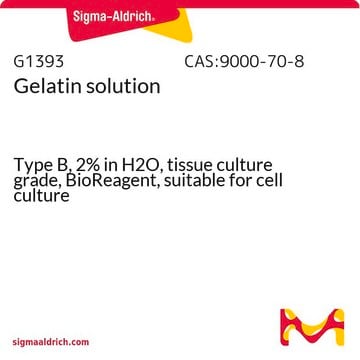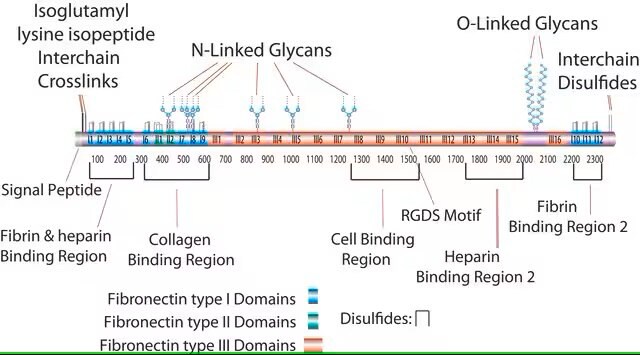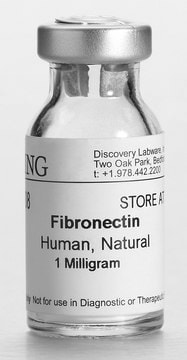FG001
Fibronectin/Gelatin Coating Solution
0.2 μm filtered, BioReagent, suitable for cell culture, Ready-to-use mixture
About This Item
Recommended Products
Quality Level
sterility
0.2 μm filtered
product line
BioReagent
concentration
1 ×
technique(s)
cell culture | mammalian: suitable
shipped in
dry ice
storage temp.
-10 to -25°C
General description
Application
- Attachment and spreading of a variety of cell types
- Suitable for use with serum-free or reduced -serum cultures
Biochem/physiol Actions
Gelatin derived proteins are extracted by boiling the relevant skin, tendons, ligaments, bones, etc. in water. Gelatin is a hydrocolloid and is rich in glycine, proline and hydroxyproline, which imparts structural stability.
Components
Gelatin is a heterogeneous mixture of water-soluble proteins, present in collagen and an ideal cell-attachment substrate for cell culture.
Preparation Note
The coated tissue culture vessels can be used immediately or stored at 4 °C for up to one week filled with PBS and wrapped in parafilm. Remove PBS only when ready to plate the cells. Do not let the coated plates dry completely.
Storage Class Code
12 - Non Combustible Liquids
WGK
WGK 1
Certificates of Analysis (COA)
Search for Certificates of Analysis (COA) by entering the products Lot/Batch Number. Lot and Batch Numbers can be found on a product’s label following the words ‘Lot’ or ‘Batch’.
Already Own This Product?
Find documentation for the products that you have recently purchased in the Document Library.
Related Content
Discover cancer research resources with modeling and profiling tools for cell culture, genomics, biomarkers, and more to help maximize your cancer research.
Discover cancer research resources with modeling and profiling tools for cell culture, genomics, biomarkers, and more to help maximize your cancer research.
Discover cancer research resources with modeling and profiling tools for cell culture, genomics, biomarkers, and more to help maximize your cancer research.
Discover cancer research resources with modeling and profiling tools for cell culture, genomics, biomarkers, and more to help maximize your cancer research.
Our team of scientists has experience in all areas of research including Life Science, Material Science, Chemical Synthesis, Chromatography, Analytical and many others.
Contact Technical Service




